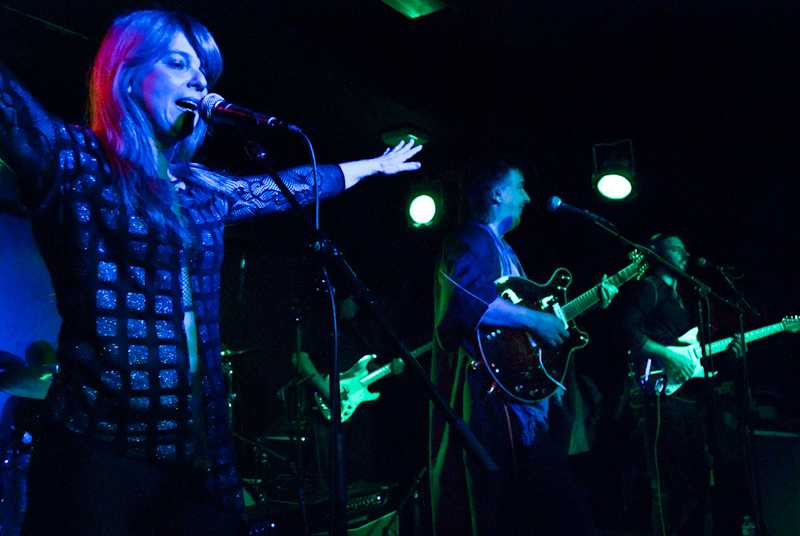Os Mutantes, Capsula Bring Rock From Below
(From left) Esmeria Bulgari, Vinicius Junqueira, Sérgio Dias and Vitor Trida of Os Mutantes trade vocal and instrumental licks during an extended jam. The band saturated the ’Sco with Brazilian beats and psychedelic sludge during its Tuesday night show.
November 15, 2013
Sérgio Dias may be the sole original member in Os Mutantes — his revolving cast of psychedelic rockers has gone through more lineup changes than the band’s home country of Brazil has presidents — but draped in a black cloak over a T-shirt, arms raised and sporting a wide grin, he looked more like a jovial father figure than an undisputed grandmaster of Tropicália. He is, of course, both.
Os Mutantes is legendary in South America, and despite garnering a few high-profile fans, their genre-bending career has met with limited acclaim here in the States. Dias’s grin was warranted, then, by the number of people who packed the ’Sco on Tuesday night to hear the group blaze through a rhythmic set spanning almost 50 years. Part nostalgia trip, part victory lap, Os Mutantes’s show articulated without words why this group defies, well, definition.
Sneering, anthemic and loud as hell, Argentine garage trio Capsula was a propulsive opener and a fabulous complement to Mutantes’s slower burn. This is a band that, in energy and aesthetic, should be playing to far bigger crowds — and touring behind its first English language album, Solar Secrets, that appears to be precisely their goal. Singer and guitarist Martin Guevara led the sonic charge like a Stooges-era Iggy Pop, spending as much time taking his histrionics into the crowd as he did flaunting them atop his monitor amplifier. “The planet is going to fucking destroy [sic], so we’ve got to have fun,” he shouted, vocals dripping with reverb, before scraping off the riff to begin the corroded shuffle of “Seven Crimes.”
Those antics were sustained by the ferocious call-and-response between Guevara and bassist Coni Duchess, as well as the heavy-handedness of drummer Ignacio Solimo, who, like Keith Moon before him, rarely abandoned the crash cymbals for the duration of the show. It’s rare to see a singer so devoted to showmanship front such a no-frills ensemble, but Capsula tapped into this dichotomy as a source of raw power. Only after Guevara’s guitar, strangled by a mic cable, was left swinging from the rafters did one remember that this was only the warm-up band.
This wouldn’t have been the first time that the good part ended early at the ’Sco this year. But after clambering onstage for a humorous soundcheck — conducted in German, no less — the six members of Os Mutantes proceeded to dispel any doubts about their performance to come. Rambling through a danceable piece of retro-psychedelia, Dias, now 62, sang as well as he did on the band’s 1968 debut. Across the board, rich harmonies and clean arrangements made the legacy act sound inspired and full of life.
A group of its stature has the luxury of being selective about which songs to play, but Os Mutantes is so consistent in its output that it was impossible to notice when batches of older tracks butted heads with much newer material — that is, when Dias wasn’t explaining his critics-be-damned approach to performance: “We’re here to put our face to slap,” he quipped. The group then tumbled into a deliciously trippy mambo. Routine, it seems, is not high on their list of priorities.
No, Os Mustantes is at its best when it’s relishing in the freedom that comes with decades of collective music-making. At heart, it is very much a jam band, and save for a few acoustic ballads, Dias kept busy by drawing extended shrieks and shudders from his guitar. It was during solos that the assorted elements of the band’s sound differentiated themselves: A samba-flavored percussion interlude by Cláudio Tchernev drew from traditional Brazilian music or even Santana at Woodstock, while keyboardist Henrique Peters dug his heels into a meaty organ tone that recalled the best stateside southern rock.
Os Mutantes’s not-so-subtle fascination with America was on full display, most evidently in songs from its own English language record, Fool Metal Jack. That album’s single is a politically charged tune called “Look Out,” which, that night, came barreling down on the heels of another recent cut, the Zeppelin-bluesy “Piccadilly Willie.” Perhaps Os Mutantes is trying to make big statements with big riffs as a way of remaining relevant at the tail end of their fourth decade together. That those two songs were the evening’s standout performances affirmed that it has at least a decent shot.
On the other hand, the band will always have one foot stuck in the summer of love — and maybe that’s not such a bad thing. It’s got nothing to prove next to neo-psychedelic disciples like the Flaming Lips and Tame Impala. Of course, Dias will never admit his greatness. He’ll just stand there with that sly grin and play on.



























